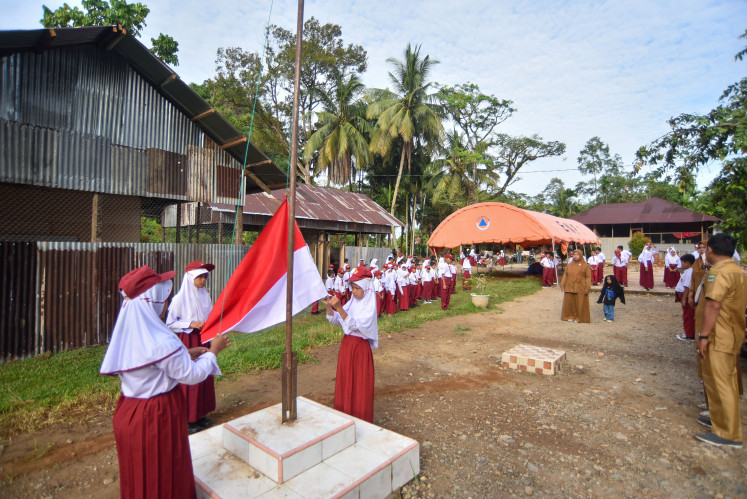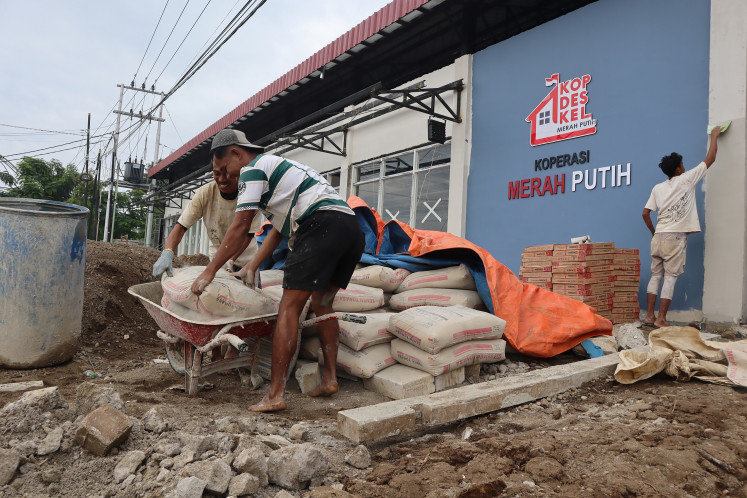Popular Reads
Top Results
Can't find what you're looking for?
View all search resultsPopular Reads
Top Results
Can't find what you're looking for?
View all search resultsChallenges in implementing Agenda 2030 for sustainable development: Where are we now?
An interdisciplinary framework of 17 “Global Goals”, otherwise known as Agenda 2030, this year marks its fifth year of implementation.
Change text size
Gift Premium Articles
to Anyone
O
n Sept. 25, 2015, 193 United Nations member states adopted the Sustainable Development Goals (SDGs), ushering a new era of international cooperation. An interdisciplinary framework of 17 “Global Goals” otherwise known as Agenda 2030, this year marks its fifth year of implementation. Although countries ranging from Finland to China have embraced and institutionalized the global goals into their national plans, recent reports have shown that progress is either slow or has regressed.
In a time where the impact of climate change has reached unprecedented extremes with a widening wealth gap for 70 percent of the global population, accelerated action to address these interdependent goals in face of social, economic and environmental repercussions is imperative. These circumstances lead us to ask: What hampers our efforts in achieving these goals and what can be done?
Advancing cross-sectoral cooperation
Global vulnerabilities and opportunities pedal the shift toward human security. As these interconnected issues continue to traverse borders and affect all sectors, the overarching challenge posed to the implementation of Agenda 2030 is to forgo isolationism and advance cooperation. In 1992, the Common but Differentiated Responsibility (CBDR) doctrine was enshrined as Principle 7 in the Rio Declaration and is applied to environmental sustainability such as Goal 13, evidenced by the UN Framework Convention on Climate Change (UNFCCC) (Article 3[1]). The doctrine states that all countries should maximize their efforts to achieve sustainable development, accounting for national differentiation. Despite its environmental dimension, Paragraph 247 of the Rio+20 Outcome Document entrenches the normative values of the SDGs, reflecting the substance and narrative of the CBDR without explicitly referencing it.
According to the German Institute for International and Security Affairs (SWP), Paragraph 247 states that goals are “global in nature and universally applicable to all countries while taking into account different national realities, capacities and levels of development and respecting national policies and priorities.”
Thus, even countries not directly affected by a particular goal still hold obligations to implement the goal at a global level. Forms of cooperation, according to more disadvantaged nations such as the G77, can include financial resources, technology transfer, capacity building and pro-development trade policies.
However, cooperation extends beyond the aforementioned. Literature on the subject has increasingly mentioned the necessity of private sector involvement toward achieving the SDGs, particularly to address the lack of investment to achieve overlapping goals such as SDG 9 on infrastructure or SDG 6 on water. Public-private partnerships (PPPs) would increase access to capital, sustainable innovation, improve access to services and help transfer risks.
Coordination, conflict of interest and tradeoffs
While advocating for horizontal and vertical cooperation is a challenge of its own, one of its many barriers is ensuring appropriate governance and coordination structures. Implementing the SDGs requires collaborative structures with which some countries have already started to experiment. For instance, in Sweden, a national delegation was set up to facilitate the country’s implementation of Agenda 2030, with responsibilities to conduct dialogues on sustainable development and its monitoring process through vertical cooperation. This cross-sectoral approach aims to enhance information exchange and knowledge dissemination among stakeholders, incorporating different segments of society and encouraging long-term participation.
Achieving multistakeholder coordination can be obstructed by conflicts of interest, particularly between the private and public sectors, leading to discord on potential tradeoffs in relation to the global goals. This is especially prevalent in the short-term, including expanding agriculture for food security, harming biodiversity, water and energy security. Steering commercial activities toward a standardized definition of sustainability are often met with resistance from economies heavily reliant on carbon-polluting industries. Argued as a “tradeoff”, action to meet targets through an effective, multidisciplinary lens in order to ensure long-term prosperity.
Sustainable finance
Accelerating the implementation of Agenda 2030 also requires mobilizing more channels for funding sustainable development. Development banks, investors and financial institutions are the most adept at tackling this challenge. In order to fund initiatives, the UN Environmental Program (EP) has advocated for green financing, increasing the level of financial flows to sustainable development priorities. However, to issue social and green bonds, banks must evaluate how SDGs have been implemented so far and map out financing in line with country trajectories in accord with the global goals.
Through these measures, financial actors can tailor loan programs and target specific goals including Socioeconomic Advancement and Empowerment (SDG 1), Affordable Basic Infrastructure (SDG 3) or Climate Adaptation (SDG 13). Through commitments such as the UN General Assembly (UNGA) Climate Summits and ICMA High-Level Mapping to the Sustainable Development Goals, financial institutions are enabled to have a positive influence on Agenda 2030.
Increasing the outreach of global goals
Despite the ubiquity of SDGs, they remain under the radar for much of civil society. In addition to the communication and advocacy efforts of UN institutes, governments could embed SDGs into their education programs, emulating South Korea and Norway.
Campaigning efforts at a national and domestic level are equally vital, achievable through innovative outreach strategies such as exhibitions, social media virality, partnerships with nonprofits and including relevant public figures on advocacy campaigns. Through increased awareness, the mobilization of civil society to localize the global goals through self-organized events can signal policymakers and C-levels of the urgency to address the global goals.
Accountability and measuring performance
Monitoring the efforts to advance SDGs remains a vital component for the credibility of Agenda 2030 and to avoid the pitfall of being vaguely interpreted. Operationalizing global goals has been challenging for policymakers worldwide. The SDG Tracker is one such resource developed by Our World in Data in an attempt to more easily digest the progress of each goal. Regardless, the ability to measure performance rests on the availability of reliable and sufficient data. In many countries, as evidenced in Uganda and Colombia, data is outdated, incomplete or not transparent. In tandem with overcoming corruption, aligning national performance indicators to SDGs and advocating for open repositories such as OpenGov can instigate further commitments by institutions to be held accountable.
The SDG Accountability Handbook (2019) by the Transparency, Accountability and Participation (TAP) Network aims to familiarize civil society with Agenda 2030 and the effective methods of holding governments accountable. By focusing on vertical accountability, the handbook democratizes the ability for individuals to pressure governments, the private sector and wider society to be liable to global goals. In this way, civil engagement with SDGs may also expand, furthering calls for transparency and commitments to Agenda 2030.
Calls for an honest reflection of Agenda 2030
As the SDGs enter their fifth year of implementation, reflections on the commitment to the global goals are more urgent than ever. This timeliness reminds all stakeholders to challenge the status quo and advance the transformative project envisioned by the global goals. To overcome the hurdles of implementation, all entities must take steps beyond declaring intent and move toward concrete actions.
The road toward achieving sustainable development is challenging, and its non-binding nature necessitates all parties to recognize the primacy of human security and adopt an SDG-oriented framework to transpose these goals into policies. Committing to cross-sectoral cooperation, unifying priorities and supporting the elements that make achieving Agenda 2030 a feasible reality are fundamental to cultivating a comprehensive and effective SDG implementation strategy.
***
Paxia Ksatryo is a 2021 master of public policy candidate at the Hertie School of Governance in Berlin. She holds a degree in social sciences from Sciences Po Paris with a regional focus on Europe and Asia.










